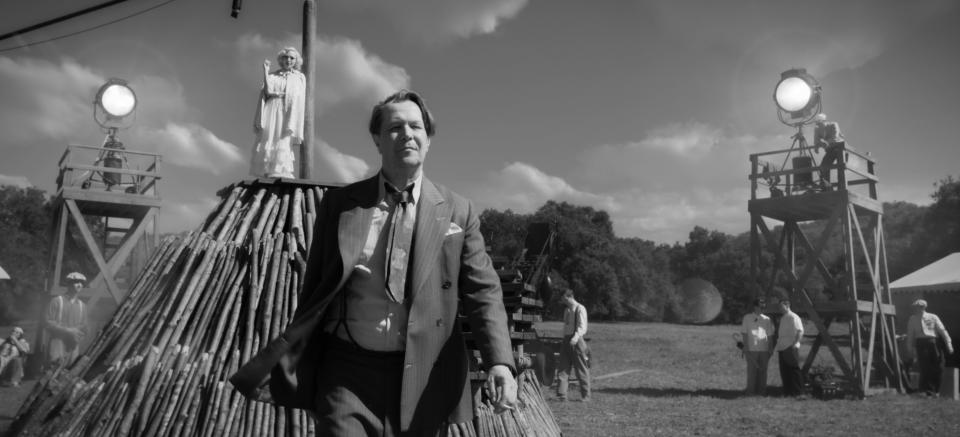Gary Oldman found 'Mank' a more challenging role than Sid Vicious or Dracula
Just when Gary Oldman was coming out of the past, the British actor was thrown into a weird present.
Oldman had finished filming director David Fincher’s “Citizen Kane” origin story “Mank” (in select theaters now, streaming Friday on Netflix) and just returned to his home in Palm Springs, California, when COVID-19 locked everything down. “So I've just been behind the gate and the hedges all this time,” Oldman says by phone from London, where he recently flew to begin work on the new Apple TV+ spy series “Slow Horses.”
Traveling during a pandemic has been “very strange,” he adds. “There's five people staying here at the hotel. The foyer in the lobby is like ‘The Shining.’ I'm waiting to turn a corner and see the two twins.
“We came through LAX, it was empty. We got to Heathrow, it was empty. It was like a weird ‘Twilight Zone’ episode.”
Review: Netflix's excellent 'Citizen Kane' origin story 'Mank' isn't just for film nerds
Holiday movie preview: 10 must-see new films to stream while stuck at home, from 'Mank' to 'Soul'

Like Rod Serling back in the day, Oldman lives the black-and-white life as “Kane” screenwriter Herman J. Mankiewicz in “Mank." The movie follows Mank working with filmmaking wunderkind Orson Welles (Tom Burke) on what will be his 1941 masterpiece, and the movie also flashes back to moments in the 1930s showing Mank’s relationships with screen starlet Marion Davies (Amanda Seyfried) and her lover, media mogul – and “Kane” inspiration – William Randolph Hearst (Charles Dance).
Nearly three years after winning best actor for his transformation into Winston Churchill for “Darkest Hour,” Oldman is garnering another round of Oscar talk for “Mank.” His performance as a Hollywood throwback is that of a legend “absolutely at the top of his game,” Seyfried says.
Oldman, 62, calls the acerbic Mank “just a joy” but also admits that “oddly enough, I found it the most challenging of any role that I've had.” And that’s saying something for an actor who’s played everyone from Sid Vicious (“Sid & Nancy”) and Beethoven (“Immortal Beloved”) to Dracula (“Bram Stoker’s Dracula”) and Lee Harvey Oswald (“JFK”).

“David said, ‘I want you as absolutely as naked as you've ever been. There's no wig, there's no teeth, there's no forced noses. Just you,’ ” Oldman recalls. “I do like the odd disguise to hide behind. But above and beyond that, you’re playing a man who has such self-loathing.”
Oldman describes Mank as “a very high-functioning alcoholic,” one who helped usher in “an era of fast-paced wisecracking characters and snappy dialogue” and was also a brilliant script doctor. When working on 1939’s “The Wizard of Oz,” it was Mank’s idea to spend more time at the start with Judy Garland’s Dorothy in black-and-white Kansas and shift to Technicolor once she travels to Oz. At the same time, in his mind, it was all beneath him.
“You've got this character who comes to Hollywood and he has such contempt and disdain for the quality of what was being put out,” Oldman says. “As an artist friend of mine used to say, it's 99% crap and then there's that 1% where excellence lives and that's what you're striving for. That became like an Everest for Mank. The peak got further and further away, and he realized he wasn't going to write that great play (or) novel, that he was in trouble with alcohol and gambling.”
Oldman figures he’s seen “Citizen Kane” a dozen times – though his Welles favorites are “Chimes at Midnight” and “Touch of Evil” – yet he promises you don’t have to be a fan to enjoy “Mank.” “I’ve watched these Marvel movies and I don't know the history of these comic book characters the way that the fans do, but I can still go in and follow the story and the people.”
And if someone was going to make a behind-the-scenes tale a la “Mank” for one of Oldman’s films, he’d pick Oliver Stone’s “JFK.”
“There was very little of Oswald on the page and back then, Oliver simply gave me some airline tickets and a per diem and said, ‘Go to New Orleans and go to Dallas and go to these places and find out who Oswald was,' " Oldman says. "I became like a journalist trying to piece together an understanding of who this man was.”

Oldman did the same thing with “Mank,” taking a personification of the adage “alcoholics are egomaniacs with low self-esteem” and making him likable.
“Orson Welles said he was one of the sweetest, funniest people he'd ever met,” Oldman says. “If you were on the (other) end of that bitterness and vitriol, God help you. But when you were in Mank's company and it was directed at other people, he was the funniest guy around.
“That's all a very sort of interesting cocktail to play.”
This article originally appeared on USA TODAY: 'Mank': Gary Oldman is back in the Oscar race as 'Citizen Kane' writer
